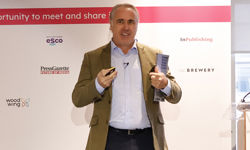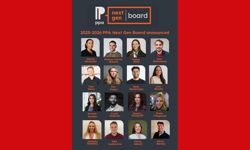When River took on its first two clients, the content plan ran as far as printed magazine – and then stopped. There were no websites, blogs, online video or tweets, such has been the pace of change since those distant days of 1994, when Google was yet to be invented and YouTube was still a decade away from birth.
These were also the days of contract publishing, a sector that has since grown and morphed into cross-platform content marketing, a multi-media discipline that is rapidly expanding into digital but that maintains – at least for River – a strong bond with its heritage in print.
Co-founder, former co-owner and now chief executive Nicola Murphy says the sector is growing as brands make greater investments in content. “Brands want to be 24/7 now and be available in every context that a customer might wish to engage with them, whether that’s bricks and mortar or via a website or a mobile phone or whatever,” she says.
“They want to be in all those areas, which gives us the opportunity to provide content across those areas. We do everything, from 140-character tweets right up to 2,000-word articles and everything in between – all the photography, videos and everything else. I think it’s because clients are really seeing the value of it; it’s all about engagement these days, isn’t it? How do you turn your customer onto your brand and your product, and content’s a good way of doing it.”
River began as the brainchild of Murphy and former colleague Jayne Wynn, who worked together as business development director and editorial director respectively for their previous employer. They believed the market needed a contract publisher with a very strong ad sales team – a combination that at the time was provided only by Redwood. Together with two other partners who brought their strong ad sales pedigree to the party, River launched and picked up two sizeable clients, Mercury Asset Management, which became Merrill Lynch, and IBM, publishing finance-focused magazines for them both.
Chocs away
Murphy explains that, to generate some PR and at the same time prove their content marketing credentials to potential clients, the team sought to echo the Cadbury Milk Tray ads that were the talk of adland at the time. Murphy and an actor dressed as ‘the Milk Tray man’ showed up unannounced at the offices of brand CEOs, their PAs, and at the offices of the trade press, with boxes of chocolates and specially designed business cards.
One of the offices they blitzed was that of ASDA’s then-CEO Archie Norman, who liked River’s approach so much that he put the company’s existing magazine out to pitch, invited River to throw their hat in the ring, and duly awarded River the business, a massive coup for River at the time.
The business grew, and about five years after launch, Barclays Ventures bought out the two partners who’d come from sales, with Murphy and Wynne in charge. Then came a bump in the road.
“We had a bit of a torrid time – the recession kicked in, we lost a couple of big clients including ASDA (Publicis Blueprint was set up to win the ASDA business, which it retained for the next sixteen years), and all of a sudden, our numbers weren’t looking like they should,” she recalls. Barclays Ventures installed their own board member, who later became a shareholder and – along with Murphy and Wynne – bought out Barclays Ventures. The three continued at the helm until last year, when the company was sold to Sun Capital Partners, the American investors who also own retailers Bonmarché and American Golf, and the printing company Polestar. The other two partners bade their farewells, and Murphy stayed on as chief executive.
Virtuous circle
River now has about twenty clients, the largest of which include the Co-operative Group, NBTY – owners of the health food chain Holland & Barrett, personal care chain Superdrug, Weight Watchers and Honda. Two decades after launch, the company no longer has any financial titles, and is primarily focused on women’s consumer content.
What sets River apart from other content publishers, Murphy says, is that in addition to producing print and video content for clients, it is unique in selling its clients’ magazines at newsstand. Healthy magazine, for instance, published for Holland & Barrett, has since January this year been sold by WHSmith, in addition to being a paid-for item in Holland & Barrett’s own stores.
“It’s brilliantly written and photographed, all about health and fitness and healthy lifestyles – now it’s one of their best-selling products and it advertises their products – it’s this beautiful virtuous circle – it makes money in and of itself as well as selling their product.” That same model of quality content proving an attractive environment for advertising has been replicated for Sally Salon Services, with Pro Hair & Beauty magazine, and with a magazine for the walking charity Ramblers, which sells at newsstand and works as a membership acquisition tool for the organisation.
Clients can see the incremental value that engaging their customers with quality content can provide, Murphy says, and can see that content, across whatever medium, leads to clicks, engagement and ultimately, purchase.
“There are a lot of ways of measuring magazines these days that aren’t just putting a survey in it,” she says. “You’ve obviously always been able to measure things with surveys and competitions, but these days you can put your web address on, you can follow links … and we have lots of case studies showing that if you have a raft of content and it’s engaging content, then the result is greater than the sum of all those individual parts. We know that if you buy a magazine in Holland & Barrett and you shop on the website and look at the content we produce for the website, you spend 400 per cent more than you would if you didn’t do any of those things.”
Long live print
River generates 80 per cent of its revenue from print and 20 per cent from digital; the digital offering is growing, and the company recently hired Claire Irvin as editorial content director. Claire has worked on mainstream newsstand titles such as Grazia, She and Sugar, and in her most recent role, led Bauer Media’s parenting titles into new digital spaces. Part of her role at River will be looking at ways to build on digital content opportunities. “There’s certainly a generation coming that will engage in more watchable content, and wearable watchable content,” Murphy says. River estimates that nine per cent of internet users in the UK already have a wearable device.
But Murphy does not see a time when digital will account for the lion’s share of revenue at River. “Some of our competitors have said print’s dead, long live digital, but we absolutely do not see that. We’ve recently won a number of print-only clients, and I think the view of print has shifted very positively.”
River points to CMI/DMA figures showing that 44 per cent of UK content marketers use print magazines – and that 40 per cent hold webinars – as indicators of how the sector is growing. CISCO forecasts that by 2017, online video will make up nearly 70 per cent of consumer internet traffic.
Across all media, Murphy says there’s a sophisticated understanding among consumers of the value of quality and how that quality is funded. “People are pretty savvy,” she says. “They’re prepared to watch or read something that’s of interest to them, so the content that you produce for whatever platform has to be specific to the brand and be something that’s not available elsewhere, ie not a commodity. They’re prepared to pay for – and pay for with their time – content that’s genuinely interesting to them.”
Marketing directors also understand the trade-off involved, and understand that the brand shouldn’t use the platform to shout about itself. “It’s got to be good enough, and that’s something marketing directors and chief executives realise,” Murphy says. “They’re not daft, they’re very willing. They absolutely realise that whether it’s a menu card or a 200-page magazine, it’s got to be the very best it can possibly be, whether it’s free or you’re selling it – and that’s the same for social media. Great content isn’t a hard sell – it’s engaging and aspirational and inspirational. If it isn’t, it’s not going to get the advertising.”
Looking after baby
As River begins its third decade, Murphy is bullish about what the future holds, and her own role within the company. “I still feel very invested in the business. We’ve had clients for a long time; we’ve worked for Holland & Barrett for twenty years, Honda for thirteen, Superdrug for thirteen. These are not just clients, they’re warm acquaintances and, in some cases, friends. I still perceive it as my baby and I still love doing it.”
She is optimistic about the future of the sector, and is keen to emphasise that while content is king, without the ‘marketing’ part of ‘content marketing’, there’s very little value to the client. “There’s no point having a brilliant magazine or a really fantastic website if no one knows where it is. It’s as much about advising and persuading the client to invest in marketing the product, not just in producing it because that’s how they get the return on investment.”
CEO: Nicola Murphy
Publications include: Passport Magazine, Healthy, Healthy for Men, Weight Watchers
Newest launch: PROinsider – a blog that will feature on the Sally Salon Services website, aimed at beauty industry professionals
Number of staff: 101 full-time staff, plus regular freelancers
Annual turnover: £18.2 million in 2014












